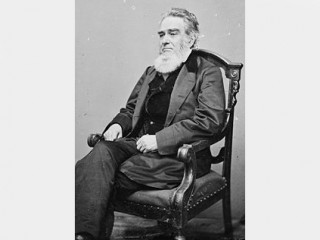
Bates Edward biography
Date of birth : 1793-09-04
Date of death : 1869-03-25
Birthplace : Belmont, Virginia, United States
Nationality : American
Category : Famous Figures
Last modified : 2010-06-10
Credited as : Attorney generall, ,
0 votes so far
Edward Bates served as attorney general in the administration of President Abraham Lincoln from 1861 to 1864. He resigned his post over disagreements about Lincoln's Civil War policies. A longtime resident of Missouri, Bates was the first U.S. cabinet officer from west of the Mississippi River.
Education and Early Work
Edward Bates was born on September 4, 1793, in Belmont, Virginia. Edward was the fourth of twelve children. His father, a planter and merchant, endured serious financial losses during America's War for Independence, leaving the family on the edge of poverty. Nevertheless, Edward was being groomed for an Ivy League education when an injury cut short his academic career. He saw some action in the War of 1812, serving as a private, corporal, and sergeant.
Bates left Virginia for the Missouri Territory in 1814. He settled in St. Louis and began studying law under the prominent attorney Rufus Easton. Admitted to the bar in 1817, Bates practiced law for several years in St. Louis. He rose to a succession of state offices, including attorney general and member of the state legislature, before being elected to the United States' House of Representatives in 1826. He was defeated in an attempt to get re-elected two years later, though he retained a leadership role in the Whig party. Bates returned to local politics, serving terms in both the Missouri Senate and House of Representatives.
Career
In 1847, Bates made a speech in Chicago that changed the course of his career. His passionate argument in favor of internal improvements before a convention on the topic attracted national attention. Three years later, President Millard Fillmore offered Bates the cabinet post of Secretary of War. Bates turned it down for personal reasons. Increasingly attracted to national politics, Bates served as chair of the Whig convention in Baltimore in 1856. He became a leading voice of the "free soil" movement that sought to keep slavery out of the territories. By 1860, the Whigs had reconstituted themselves as the Republican party, and Bates was being spoken of as a possible presidential candidate. His candidacy fizzled, however, as Abraham Lincoln received the Republican nomination. Lincoln recognized Bates's importance to the party by offering him his choice of cabinet positions other than secretary of state. Bates was sworn in as attorney general on March 5, 1861.
Successes
Bates enjoyed early success in his role as attorney general. He was an early advocate for the emancipation of slaves and a moderate war policy. During the Trent Affair, in which two Confederate agents were seized from a British ship by a Northern vessel, Bates argued for restraint and helped avert war with Great Britain. He was not afraid to break with the president on important matters, such as the admission of West Virginia to the Union. In that instance, Bates contended forcefully that the West Virginia government was committing an act of secession from Virginia proper.
Challenges
Bates found it increasingly difficult to overlook his differences with fellow cabinet members, however. As the Civil War intensified, Bates felt that the constitutional rights of citizens were being trampled upon. Moreover, he felt that other cabinet members, particularly Secretary of State William Seward, were meddling in the affairs of the attorney general's office. On November 24, 1864, as a consequence of these disputes, Bates handed President Lincoln his letter of resignation.
Vision
Bates was a principled moderate who fought against the influence of radical elements within the Republican party. Other than the rule of law, he valued the principal of emancipation the highest. He showed his commitment to this cause by freeing his own slaves.
Personal Life
Bates married Julia Davenport Coalter in 1817. Together they raised seventeen children. After leaving Lincoln's cabinet, he returned to St. Louis and remained active in state politics until his death on March 25, 1869.
















